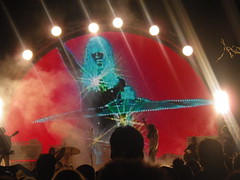One year ago today, Ryan and I were in New York, the halfway mark in our first cross-country road trip. Today we are enjoying Canada Day in Canmore, Alberta, a beautiful little town just outside Banff National Park.
We departed California on June 19 and made our way east through Nevada to Idaho, where we saw the Craters of the Moon National Monument (lava tubes and craters in the middle of the greenest, lushest potato country imaginable), and bathed at Lava Hot Springs before trundling on to Wyoming. We camped at Jackson Lake in Grand Teton National Park, encountered a moose on the Jenny Lake trail, before moving on to Yellowstone. Ryan had never seen a geyser before, so we were extra lucky to catch Old Faithful sounding off twice during our afternoon at the park. We saw bison shedding their fur, black bears, elk, moose, marmots, squirrels, deer, and an uncountable number of fellow humans.
From Yellowstone we headed northwest through Montana's Big Sky country toward Glacier National Park. We spent one day on each side of the park, starting at Avalanche Creek on the west side, where we nearly hit a black bear as it scuttled across the road. The sunset was spectacular over Lake MacDonald, but we also loved camping at Rising Sun on the west side, near Many Glacier, where we spotted a Grizzly bear. From Glacier we drove the 35 miles across the border to Waterton National Park in Alberta, a scenic little village with perhaps a higher deer population than people. We enjoyed hot chocolates at the Prince of Wales Hotel, a historic hotel perched high above Waterton Lake.
We made it to Banff in time to celebrate Ryan's birthday by hiking Sulfur Mountain and taking the gondola back down to the hot springs. We had planned to camp tonight in Jasper, but campgrounds in all directions are booked for Canada Day.
Our journey is slowly approaching its halfway point. Tomorrow we plan to drive to the Columbia Icefields, and hopefully camp near Jasper, before turning our wheels westward toward Vancouver. We've been operating off the grid so far, making gourmet dinners on Ry's new camp stove, and averaging 3-5 mile hikes in the mornings.
Basically, we're becoming Canadian mountain goats, and from what we've seen, that's a good thing.

